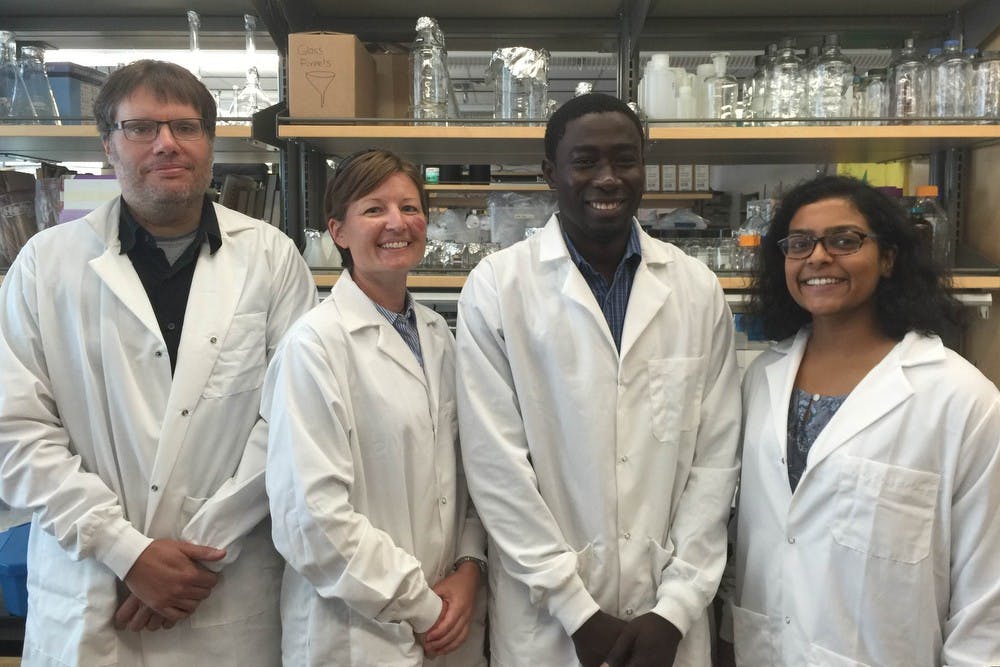While most people wouldn't think twice about studying bugs, ASU professor Arianne Cease has made locusts the center of her research, which could change the world.
Cease, assistant sustainability professor and a senior sustainability scientist at the Julie A. Wrigley Global Institute of Sustainability, leads an innovative study of locusts and the environmental and behavioral factors that trigger the insects to swarm.
This year she was named on Popular Science Magazine's "Brilliant 10" list, which recognizes innovative individuals who are reshaping science, engineering and the world.
During her time as an undergraduate student at Oregon State University, Cease developed an interest in physiological ecology, or how organisms adapt to environmental conditions.
After receiving her degree in 2004, Cease wanted to apply her undergraduate studies to a real-world context, which prompted her to join the Peace Corps in 2005. She spent a year in Senegal where she experienced an insect swarm first-hand.
“The village where I was living was descended upon by hoards of grasshoppers, who ate everything,” Cease said.
Her experience in Senegal prompted her to dedicate her Ph.D. research at ASU to examining the cause of locust outbreaks and determining sustainable solutions to prevent future harm, Cease said.
After finishing her Ph.D., Cease took a postdoctoral research position in Australia at the University of Sydney. There, she studied how animals balance nutrition and learned more about the methods used to study locust behavior that leads to destructive swarms. She said she also wrote grant proposals to do a comparative study of locusts in rural communities in West Africa, China and Australia.
In 2013, the National Science Foundation awarded Cease and her team a grant to look at the interactions between locust plagues and human livelihood through natural and social science perspectives. She said she works with farmers, pest management agencies, social scientists and other biologists in North America as well as at their field sites around the world. At ASU, her lab is made up of researchers from the School of Sustainability and School of Life Sciences.
Biology sophomore Balanding Manneh is from The Gambia who has been a member of Cease’s research team for six months. In the spring of 2015, Manneh said he received ASU’s SOLUR Undergraduate Researcher Award, enabling him to travel to Senegal with Cease during the summer to study how locust outbreaks affect farming communities and food security in Senegal and Sub-Saharan Africa.
“My project is looking at how specific land management systems and practices contribute to frequency of locust outbreaks,” Manneh said.
During his time in Senegal, Manneh said he was responsible for conducting interviews with farmers and other environmental experts in the area.
Sustainability assistant research professor Stephen Rogers said his research focuses on the insect’s behavioral changes.
“I’m interested in how locusts switch in behavior and how they turn from avoiding each other to being attracted to each other,” Rogers said. “We know that there are quite profound changes in their brains and nervous systems, and they completely re-configure themselves when their lifestyle changes.”
Microbiology sophomore Ruth Farington said her research role focuses on the locust’s behavior, water dynamics and diet.
“The innovative nature of the questions we’re asking is kind of a different way of looking at science,” Farington said. “No one really ever told me that research could be this interesting and we could use normal scientific questions to answer a bigger problem like plagues,” she added.
Jenni Learned is a senior research specialist who also manages the lab and assists in research and maintaining lab materials. One characteristic Learned appreciates about the study is “it brings in collaborators and people like the farmers we are working with in Senegal to the forefront of the research, but at the same time it provides opportunities for students and people who are based here in the laboratory to be a part of the bigger picture.”
Learned believes that the locust lab’s incorporation of both the sustainability and life science departments is setting the standard for multi-department collaboration in the biological research field.
Correction: An earlier version of this article was accompanied by a photo with Arianne Cease's first name misspelled. The article has been updated.
Related Links:
ASU achieves top ranks in collegiate sustainability indexes
Valley mayors discuss plans for sustainable futures
Reach the reporter at rscantre@asu.edu or follow @rumercantrell on Twitter.
Like The State Press on Facebook and follow @statepress on Twitter.




